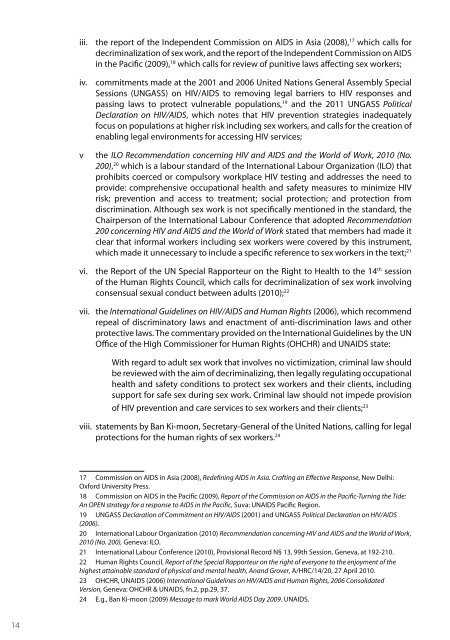SEX WORK AND THE LAW - HIV/AIDS Data Hub
SEX WORK AND THE LAW - HIV/AIDS Data Hub
SEX WORK AND THE LAW - HIV/AIDS Data Hub
You also want an ePaper? Increase the reach of your titles
YUMPU automatically turns print PDFs into web optimized ePapers that Google loves.
iii. the report of the Independent Commission on <strong>AIDS</strong> in Asia (2008), 17 which calls for<br />
decriminalization of sex work, and the report of the Independent Commission on <strong>AIDS</strong><br />
in the Pacific (2009), 18 which calls for review of punitive laws affecting sex workers;<br />
iv.<br />
v<br />
commitments made at the 2001 and 2006 United Nations General Assembly Special<br />
Sessions (UNGASS) on <strong>HIV</strong>/<strong>AIDS</strong> to removing legal barriers to <strong>HIV</strong> responses and<br />
passing laws to protect vulnerable populations, 19 and the 2011 UNGASS Political<br />
Declaration on <strong>HIV</strong>/<strong>AIDS</strong>, which notes that <strong>HIV</strong> prevention strategies inadequately<br />
focus on populations at higher risk including sex workers, and calls for the creation of<br />
enabling legal environments for accessing <strong>HIV</strong> services;<br />
the ILO Recommendation concerning <strong>HIV</strong> and <strong>AIDS</strong> and the World of Work, 2010 (No.<br />
200), 20 which is a labour standard of the International Labour Organization (ILO) that<br />
prohibits coerced or compulsory workplace <strong>HIV</strong> testing and addresses the need to<br />
provide: comprehensive occupational health and safety measures to minimize <strong>HIV</strong><br />
risk; prevention and access to treatment; social protection; and protection from<br />
discrimination. Although sex work is not specifically mentioned in the standard, the<br />
Chairperson of the International Labour Conference that adopted Recommendation<br />
200 concerning <strong>HIV</strong> and <strong>AIDS</strong> and the World of Work stated that members had made it<br />
clear that informal workers including sex workers were covered by this instrument,<br />
which made it unnecessary to include a specific reference to sex workers in the text; 21<br />
vi. the Report of the UN Special Rapporteur on the Right to Health to the 14 th session<br />
of the Human Rights Council, which calls for decriminalization of sex work involving<br />
consensual sexual conduct between adults (2010); 22<br />
vii. the International Guidelines on <strong>HIV</strong>/<strong>AIDS</strong> and Human Rights (2006), which recommend<br />
repeal of discriminatory laws and enactment of anti-discrimination laws and other<br />
protective laws. The commentary provided on the International Guidelines by the UN<br />
Office of the High Commissioner for Human Rights (OHCHR) and UN<strong>AIDS</strong> state:<br />
With regard to adult sex work that involves no victimization, criminal law should<br />
be reviewed with the aim of decriminalizing, then legally regulating occupational<br />
health and safety conditions to protect sex workers and their clients, including<br />
support for safe sex during sex work. Criminal law should not impede provision<br />
of <strong>HIV</strong> prevention and care services to sex workers and their clients; 23<br />
viii. statements by Ban Ki-moon, Secretary-General of the United Nations, calling for legal<br />
protections for the human rights of sex workers. 24<br />
17 Commission on <strong>AIDS</strong> in Asia (2008), Redefining <strong>AIDS</strong> in Asia. Crafting an Effective Response, New Delhi:<br />
Oxford University Press.<br />
18 Commission on <strong>AIDS</strong> in the Pacific (2009), Report of the Commission on <strong>AIDS</strong> in the Pacific-Turning the Tide:<br />
An OPEN strategy for a response to <strong>AIDS</strong> in the Pacific, Suva: UN<strong>AIDS</strong> Pacific Region.<br />
19 UNGASS Declaration of Commitment on <strong>HIV</strong>/<strong>AIDS</strong> (2001) and UNGASS Political Declaration on <strong>HIV</strong>/<strong>AIDS</strong><br />
(2006).<br />
20 International Labour Organization (2010) Recommendation concerning <strong>HIV</strong> and <strong>AIDS</strong> and the World of Work,<br />
2010 (No. 200), Geneva: ILO.<br />
21 International Labour Conference (2010), Provisional Record N§ 13, 99th Session, Geneva, at 192-210.<br />
22 Human Rights Council, Report of the Special Rapporteur on the right of everyone to the enjoyment of the<br />
highest attainable standard of physical and mental health, Anand Grover, A/HRC/14/20, 27 April 2010.<br />
23 OHCHR, UN<strong>AIDS</strong> (2006) International Guidelines on <strong>HIV</strong>/<strong>AIDS</strong> and Human Rights, 2006 Consolidated<br />
Version, Geneva: OHCHR & UN<strong>AIDS</strong>, fn.2, pp.29, 37.<br />
24 E.g., Ban Ki-moon (2009) Message to mark World <strong>AIDS</strong> Day 2009. UN<strong>AIDS</strong>.<br />
14
















